

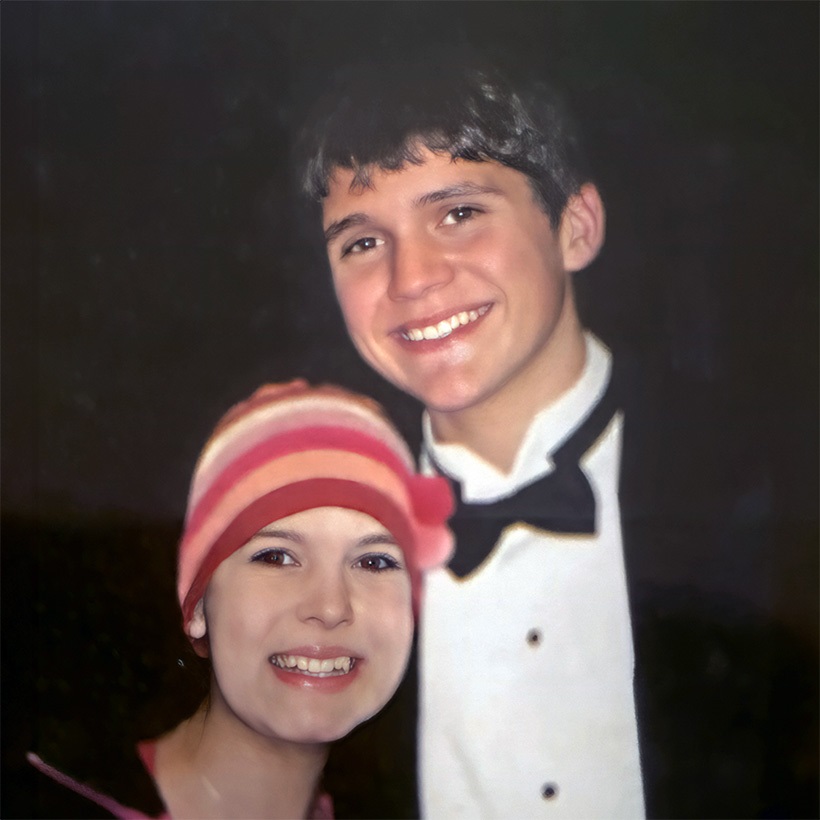
After his good friend died of leukemia at a young age, Dr. Kevin King found a new purpose and passion in life.
Kevin King, MD was born into a musical family. His grandpa was a band director. His mom was a singer, his dad played trombone. So, you might think that the young Batavia, Illinois, native would march to the beat of the same drummer.
No. But his future was beyond anything he could imagine.
“Everyone around me was very musical, and while I loved music, too, I always wanted to be a TV personality like Matt Lauer and deliver the news,” Dr. King says. “So, I was always something of the black sheep of the family.”
Then a pint-sized girl with a “ton of attitude” propelled young Kevin down a career path that had nothing to do with music or TV news. And it all started when she taught him how to SING.
Kevin and Ashley met when their neighboring elementary schools merged into one, large middle school in sixth grade. There were a lot of new people at school, Dr. King recalls, but despite her small stature, Ashley stood out from the start.
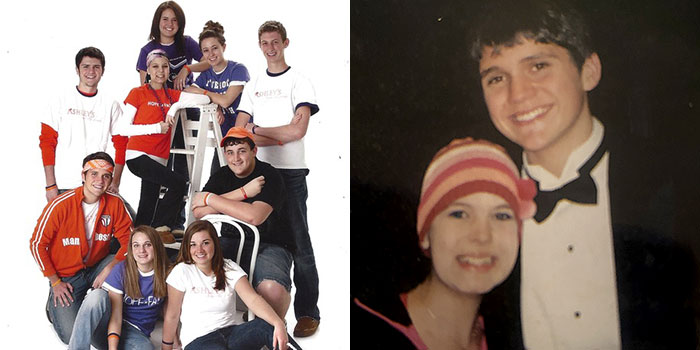
“What Ashley lacked in size, she made up for with her big personality,” he says. “She was incredibly outgoing and had this amazing attitude and approach to life.”
Ashley and Dr. King became fast friends. They attended dances at the teen center on Friday nights and bonded over their shared love of the movie Miss Congeniality, especially the part toward the end when Sandra Bullock’s character demonstrates how to SING, an acronym for the solar plexus, instep, nose and groin—four of the most sensitive areas of the body.
If anyone ever teased Ashley about how small she was, she’d be right there to deliver SING with a quick elbow to the solar plexus or a stomp on the instep at full speed, Dr. King laughs.
Ashley was also very involved in school activities and sports, like playing French horn in the band, playing soccer and competing in gymnastics. So, when she started experiencing hip pain later that year, she chalked it up to too much physical activity. In May 2002, she learned the culprit was actually something much more challenging: leukemia.
As shocking as the diagnosis was, the Batavia community rallied around Ashley and her family. Young Kevin and a few other middle school students closed tight ranks around their dear friend, dubbing themselves “Ashley’s Angels.” The group raised money and awareness by organizing spaghetti dinners, leading Relay for Life teams and selling orange wristbands printed with “Hope & Faith”—the words Ashley came to live by.
“There was probably a period of five years when every single person in our town was wearing an orange wristband at all times,” Dr. King says.
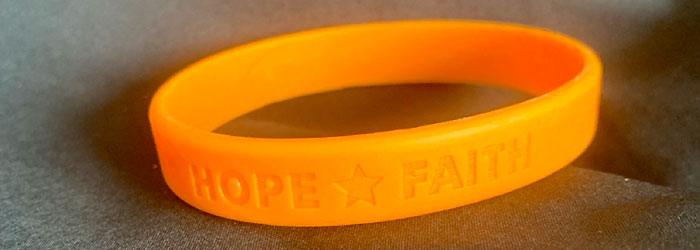
From 2002 to 2009, Ashley endured treatment after treatment, and she was in and out of the hospital. Every time she went into remission, though, her cancer returned.
Still, whenever Dr. King or other members of Ashley’s Angels visited her, Ashley was nothing but upbeat.
“Even when she was at the lowest of lows, she’d never let you know it,” he says. “Whenever someone told her they were praying for her, she’d say, ‘No, don’t pray for me. Pray for these other kids at the hospital with me. They’re the ones who really need it.’ Her spirit the entire time was infectious. You wanted to be a better person just by being around her.”
During one particularly low point, Dr. King and the other Ashley’s Angels decided to get matching “Hope & Faith” tattoos, with Dr. King choosing to get his on his chest, right over his heart.
When Ashley turned 18, she decided she was done fighting. “It wasn’t the kind of life she wanted to live anymore, and because she was an adult, it was her decision to make,” Dr. King says. Ashley stopped aggressive treatments and, in August 2009, passed away at age 19.
Witnessing Ashley’s cancer battle changed something in Dr. King.
“I decided I wanted to help people and do whatever I could to find a cure,” he says. “I’d always liked science and I was good at it, so my mindset switched to research. I figured that was the area where I could make the most difference.”
Dr. King took that plan with him to the University of Wisconsin-Madison (UW Madison). He joined a lab and spent much of his undergraduate years working on neuroscience research. Yet while Dr. King’s time in the lab underscored his love for science, it also taught him something about himself: “I realized I couldn’t be cooped up for eight hours a day without any human interaction. It just wasn’t me.”
At that point, Dr. King decided to switch his focus from research to becoming a health care provider. He took the medical school admission test, but then he met a doctor who changed his course again.
“I worked very closely with a public health doctor at UW Madison who told me his one regret was not joining the Peace Corps before becoming a doctor,” he says. “That struck a chord with me, and I asked him why. He told me it was because once you become a medical provider, you’re placed on a higher pedestal, so you’re always working for a community and never with a community. That resonated with me, and that day, I went home and started the Peace Corps application process.”
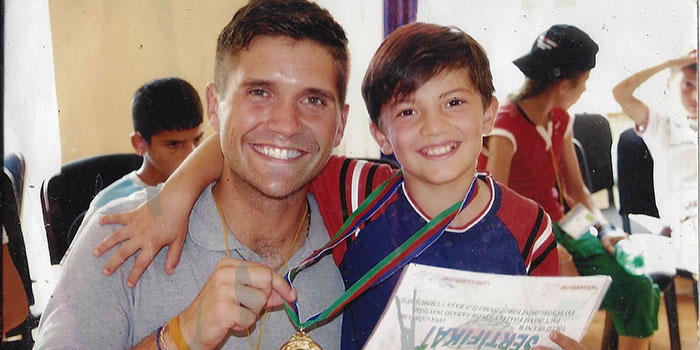
Dr. King spent two years in Azerbaijan with the Peace Corps, working specifically with the SOS Children’s Villages, an organization that helps provide stability to vulnerable children, families and communities. When he came back from the Peace Corps, he entered medical school at RUSH Medical College in Chicago.
Initially, Dr. King’s plan was to become a pediatric medical oncologist, but when he spent the summer between his first and second years of medical school shadowing medical, surgical and radiation oncology specialists through a program at Johns Hopkins University, he realized he was drawn to radiation oncology.
“The treatments they gave patients had fewer side effects than the chemotherapies and other medicine-based therapies, at least from what I could see,” Dr. King says.
After medical school, Dr. King performed a yearlong internship at University of Illinois Hospital and Health Sciences, followed by a radiation oncology residency at RUSH University Medical Center. During his residency, he served as chief resident and was named Resident of the Year, Researcher of the Year and earned Crain’s Healthcare Hero Award.
When Dr. King joined City of Hope® Cancer Center Chicago in August 2023 as a radiation oncologist, he knew it was the right fit. “I literally have ‘hope’ tattooed across my heart,” he says.
It was also a place where he knew could model the kind of care he saw Ashley receive and form the kinds of connections she’d made with her providers.
For example, when a cancer patient had a mass pushing on his spinal cord that made him lose his ability to walk and put him at risk for permanent paralysis, Dr. King was the one who was able to convince him that treatment was the right course.
“The patient was a pastor and believed God would answer his prayers,” he says. “I sat down with him and was able to say, ‘While I respect your position and understand how difficult it is for you, why am I here today? How did I get to be in the same room with you?
“I was able to convey to him that it doesn’t have to be either/or,” he says. “It can be yes/and. You can have a strong relationship with God and still accept medical treatment.”
The patient listened to Dr. King’s words, received radiation therapy and regained his ability to walk.
Today, Dr. King and his husband, Zak Dabbas, live in downtown Chicago. Dabbas, a testicular cancer survivor, is an entrepreneur and co-founder of Punchkick Interactive, a digital agency that provides software solutions for brands like Microsoft and Marriott International. His company reaped in several accolades, including being considered one of Chicago’s best places to work by Crain’s and the Chicago Business Journal before it was bought in 2020.
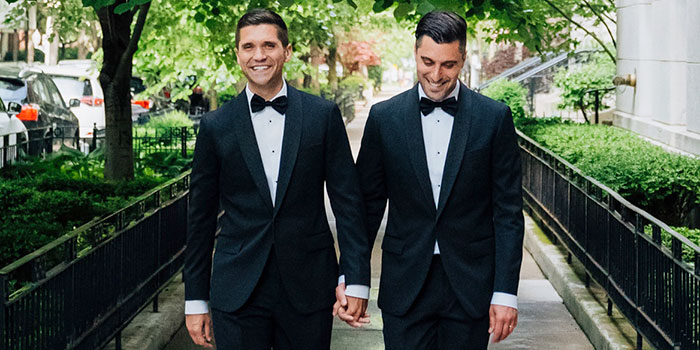
While Dr. King and Zak are hoping to become parents someday, right now, they’re embracing their freedom.
“We don't know how to cook,” Dr. King says. “We love to try new restaurants, go to random, pop-up events that are going on, or just go exploring. We walk everywhere.”
Dr. King also goes back to Batavia with the other Ashley’s Angels from time to time to visit Ashley’s mom and marvel over the impact their friend had on their lives.
“We all went into medicine or something associated with medicine because of Ashley,” he says, noting one member became a psychologist, one became a family practice doctor, one a physical therapist and another an oncology nurse. “She inspired so much within all of us that it’s just become who we are. She changed all of our lives and shaped all of our careers.”
But even if Ashley did change his path’s trajectory, Dr. King says he can’t imagine a more perfect destination: “I’ve come to realize that what I do—talking to patients and reporting on cancer updates and what data we’re using to make certain recommendations—it’s almost like broadcast journalism,” he says. “I’m constantly in front of patients, talking to them, explaining things, making them feel supported and giving them hope that they’ll get through this. And, for me, it all circles back to Ashley.”